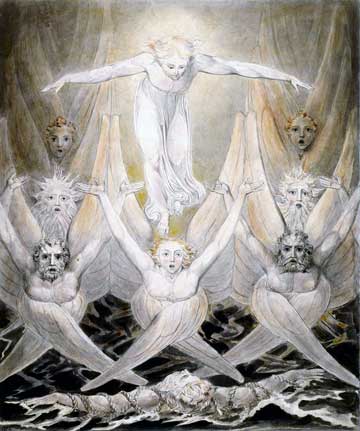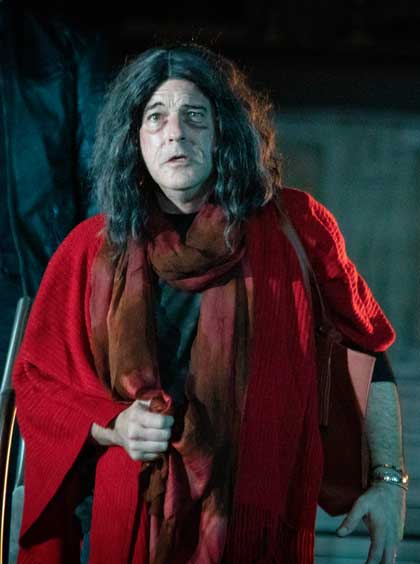Opera (1964)
A Parable for Church Performance, Op. 71
Music by Benjamin Britten
Libretto by William Plomer
Enigma Chamber Opera
The Cathedral Church of St. Paul
138 Tremont Street, Boston, MA
October 22-23, 2021
Kirsten Z. Cairns, Artistic Director; Edward Elwyn Jones, Music Director
With Matthew DiBattista (TheMadwoman), Aaron Engelbreth (The Ferryman), David McFerrin (The Traveller), Linus Schafer Goulthorpe (The Spirit of the Boy), Paul Soper (The Abbot), Thomas Oesterling (Traveling Player)

“David Delivered Out of Many Waters” c 1805
A group of players comes together to tell a tale, in turns dramatic, tragic, poignant, inspiring; each of them, in turn, takes a role in the depiction of the tale. The tale is about a madwoman (Matthew DiBattista), who seeks her missing son. Encountering a ferryman (Aaron Engebreth) on the banks of the imaginary Curlew River in East Anglia, England, she learns that her son has drowned. Devastated, she goes to his grave which she learns is by the river, and at the moment of deepest despair, has a vision of her son as spiritually present, as in some sense reborn in a heavenly realm.
This opera was one of three written by noted British opera composer Benjamin Britten as “parables” for performance in a church setting. Narratively minimal, and short at 75 minutes, it is intended as more of an intimate oratorio, an inspirational and meditative musical exploration that has some aspects of traditional opera, but which is quieter, more reflective, and in many ways smaller than staged opera. Though indeed some of Britten’s great operas, like Billy Budd (1951), have many of the same tragic and plaintive qualities that Curlew River does, it also has more overall dramatic thrust. Curlew River is essentially a short tale, a vignette, and, though a potent drama, one more in miniature.
Inspired by a Japanese Noh drama Sumidagawa by the fifteenth century playwright Juro Motomasa, the libretto by William Plomer is spare but vividly emotional. The main characters are the Madwoman and the Ferryman, who exchange the relevant details about the lost son, and evoke, through their exchange, the evolving realization that the woman’s son has drowned.
This performance is expertly rendered, with exquisite voices, wonderful instrumental accompaniment, and simple but effective staging. The choral cast is pared down a bit from the original, which makes for a welcome sense of intimacy.
The opening is fabulously done, with plainclothes members of the cast, interspersed with the audience and indistinguishable from them, all of a sudden starting to sing fully and resonantly from their seats. Masked for COVID, along with everyone else, they gradually rise up, and in their plain, somewhat ratty, clothes mount the stage. These are the players of the piece who congregate to tell the tale of the drowned boy and his distraught mother, and they appear, in their first incarnation, almost like a gathering of homeless men who have come to support one another in rehabilitation. Initially, with a bit of the feeling of an AA meeting, this gathering colored by the exquisitely rich vocal renderings delivers a genuine poignancy.
As Enigma Artistic Director Kirsten Z. Cairns explained in a beautifully articulated introduction to the audience at the outset, this production is conceived as a kind of gift to the public in the spirit of return to public life and artistic engagement in the midst of what is, hopefully, the waning of the COVID-19 pandemic. This emergence of the cast of vagabonds from the audience at the outset thus has a particular potency in depicting the trauma of the community at large. And, as Cairns went on to suggest, that this group of vagabonds under the inspiration of their leader The Abbot (Paul Soper), puts together a depiction of loss and redemption is an act of love and hope. Indeed, as Cairns further indicated, that is precisely what Enigma has sought to do with this production of Curlew River itself.

in “Curlew River”
Photo: Ashlee Rose Scott
Courtesy of Enigma Chamber Opera
The richness of the voices is immediately apparent from the outset and carries that potency throughout.
Notably, Matthew DiBattista’s role of the Madwoman is written for a tenor, but he has a rich voice that fills with baritone resonances that reverberate the plaintive declarations of the role. Aaron Engebreth’s baritone as The Ferryman starts with a kind of wiry alarm that compellingly broadens and deepens as the performance continues, his initial dramatic tautness easing and filling out its vocal space with the evolution of the dramatic and musical narrative. Though his appearance is brief, Linus Schafer Goulthorpe, as the spirit of the boy, is heartbreakingly pure of voice, a singular treble bell that chimes in the midst of the darkly moving musical landscape. All the other voices are notably good, and the overall effect in ensemble is compelling.
Britten’s music, here, as in his longer operas, is eloquent, artfully shaped, persuasive and moving. With the role of a snare drum and the invocation of a few notes of the horn, or the alternation of several blasts and the sweep of the harp, he sets an entire mood.
The desperation of the Madwoman who cries All I can do is weep! I cannot pray! I am struck down! is made manifest in Britten’s score, while, at the musical margins, the hints of resolution emerge. At the end, with the convincing peal of the spirit-boy’s voice, the vagabond players put their street clothes and masks back on, and their declaration that In hope and grace ends our mystery seems, for that potent moment, vivid and true, echoing in the aisles as one leaves the hall.
Indeed, this beautifully presented chamber version of Britten’s dark but enlivening work is a piece for the moment, for the time of emergence from this devastating pandemic that has taken and compromised so many lives and made so many wonder when the light will return. In this performance, it most certainly does.
– BADMan (aka Charles Munitz)
Leave a Reply